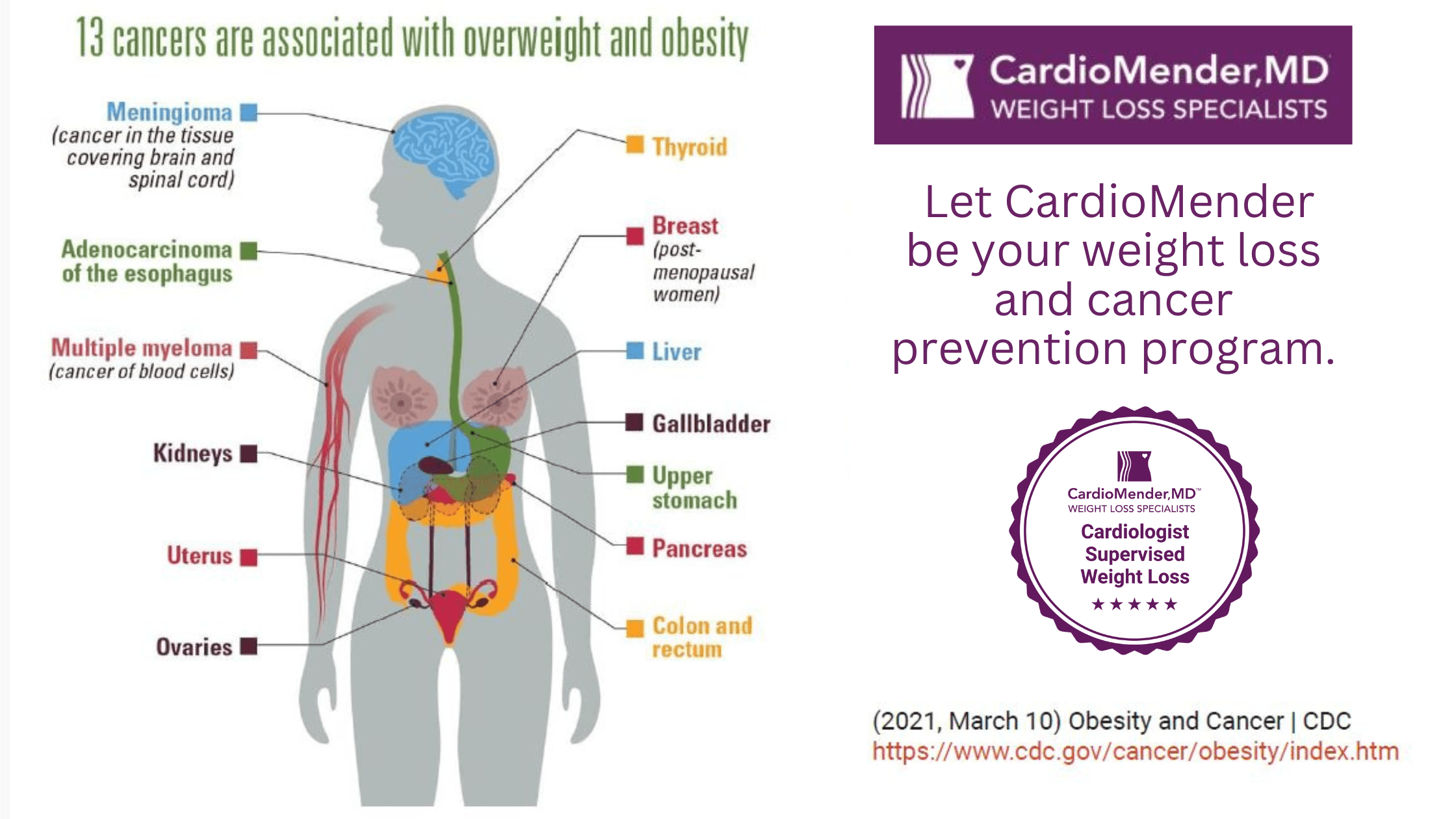Many of us know that being overweight or obese is unhealthy. What many people might not realize is just how serious the ramifications of obesity are and how important weight loss is for not just your appearance, but also for your wellbeing.
Some may consider obesity a “lifestyle choice” while considering cancer a disease, not realizing how closely linked they are. The relation between this dangerous duo means that weight loss for people who are overweight is imperative.
In a groundbreaking article published in Internal Medicine News, researcher Ian Lacy reports on findings from the Centers for Disease Control and Prevention (CDC) that link obesity to an increased risk of developing at least thirteen different types of cancers (Lacy).[1]
Where We Are Now
Being overweight is a major crisis and today the American obesity epidemic is in full swing. Research released in early October 2017 from the CDC showed that obesity in America hit a record high, with nearly 19% of youth and 40% of adults now qualifying as obese (Larned).[2] One of the most concerning things about this data is that there have actually been more government efforts launched to promote weight loss and to combat obesity since 2000, but the epidemic shows no signs of slowing down (Larned). The only piece of news in the report that seemed to show a turn in the right direction was the youth rate of obesity, which, despite being too high, has managed to stay stable (Larned).
With these statistics in mind, it’s time to look at an even scarier issue: cancer.
The CDC’s Findings
The CDC put together a wide range of data in its report. C. Brooke Steele, DO, from the Division of Cancer Prevention and Control, and her associates found that obesity-related cancers, including colorectal cancer, increased by 7% (Lacy). This increase occurred between 2005 and 2014, corresponding with the increase in the American population that is overweight and obese (Lacy). It’s clear that what we are seeing isn’t just correlation—it’s causation, as well.
To make this percentage more concrete, the CDC listed the actual number of people who had developed a weight-related cancer at 631,604 (Lacy), representing 40% of all cancer diagnoses in 2014 (of which there was a total of 1.6 million) (Lacy). The director of the CDC called these findings a “cause for concern,” remarking that America needed to do better to get its weight issue under control and promote nationwide weight loss (Lacy).

Age & Gender
Another notable finding was the impact of age and gender on the obesity-cancer link. Women and older people were most likely to be affected by this trend (Lacy). Two thirds of obesity-related cancers occurred in people between 50 and 74 years old (Lacy). Women were also two times more likely than men to have obesity-caused cancers (Lacy).
For those wondering why this gap exists, the answer is surprisingly simple: more women are vulnerable to certain types of cancers. Endometrial and ovarian cancers, as well as postmenopausal breast cancer, are specific to women (Lacy). These female-specific cancers accounted for 42% of the obesity-related cancer epidemic (Lacy). While there are more risks for women who are overweight, the obesity epidemic is serious and damaging for all.
The Good News
Bleak though these reports may be, there was a bright spot in the CDC’s report linking obesity and cancer. Cancers not related to being overweight or obese have dropped 13% (Lacy). Non-obesity related colorectal cancer has especially decreased, plummeting 23%, a decrease mainly due to advanced technology that allows doctors to see cancerous polyps more clearly (Lacy). These downturns show that there is hope. With weight loss, the weight-related cancer in America can decrease.
What Can Be Done
Obesity is not incurable. With weight loss programs and weight management, we can move America into safer territory and improve health across the country. Being overweight or obese is not something that needs to be permanent.
CardioMender, MD Weight Loss Specialists is South Florida’s most trusted medically supervised weight loss program. We provide customized, safe, rapid weight loss and the means to keep it off. At CardioMender, MD a doctor is ALWAYS available. Start losing weight today, under the supervision of Chief Medical Officer Barry H. Schiff, MD, a 32-year veteran Board-Certified Cardiologist and Internist. Dr. D. Allen Young is a Board-Certified Obesity Medicine Physician and Internist.
To find out more about how we can help you reach your goals using proven strategies, please visit us at www.cardiomenderweightloss.com or call us at 954-628-3802 to set up your appointment today.
References
Lacy, Ian. CDC: Forty percent of cancers linked to overweight or obesity. 10 10 2017. Document. 03 12 2017.
Larned, Victoria. Obesity among all US adults reaches all-time high. 13 10 2017. Document. 03 12 2017.
[1] Lacy, Ian. CDC: Forty percent of cancers linked to overweight or obesity. 10 10 2017. Document. 03 12 2017.
[2] Larned, Victoria. Obesity among all US adults reaches all-time high. 13 10 2017. Document. 03 12 2017.




